PORTLAND, Ore. (KOIN) — Five years ago, the City of Portland cleaned up 3122 homeless camps. The next year that number dropped to 2828, then to 2169. Last year, only 248 homeless camps were cleaned up in Portland.
The dramatic drop in camps cleaned up is largely because policies during the pandemic left them alone. At the same time, the city budget to conduct cleanups has more than quadrupled. City officials said that’s because “the need to more holistically address unsanctioned urban camping has grown.”
That means trying to get people into homeless services instead of just kicking them out. This slow process is part of the reason people in Portland neighborhoods feel abandoned.
‘I’m not going to be chased off by the homeless’
Just off I-5 at North Lombard and Montana, residents told KOIN 6 News they’ve tried to get the city to help them clean up the homeless camp in their neighborhood.
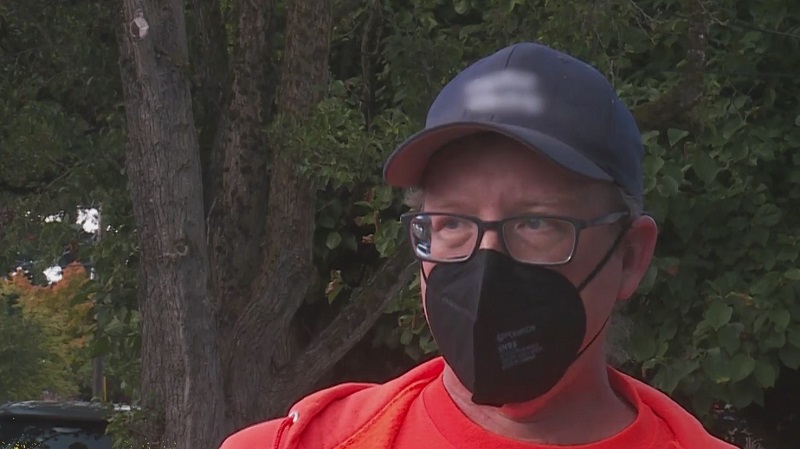
“City officials or whatever should, like, listen to us,” said Alex Hall.
Dale Hardt said neighbors were “willing to share” some space, “but this isn’t sharing when they just take over a neighborhood and have no laws that they have to follow.”
“The frustration is actually just seeing the encampments growing, getting bigger and bigger and bigger,” neighbor Joel Morales said.
Laurie Sugahbeare said, “We are literally scared for our families, our property.”
Over months their pictures document the tents, trash and RVs on both sides of the fence that separates the neighborhood from the freeway. They’ve seen fires, had packages stolen and been threatened.
“We’re completely tolerant of people that are experiencing houselessness. That’s not a big deal, but it reached kind of a threshold or a line when we started observing a lot of drug deals, start observing like physical violence between people,” Hall said. “At one point we had somebody that wanted to get our son, our oldest son who’s two-and-a-half, into a car.”
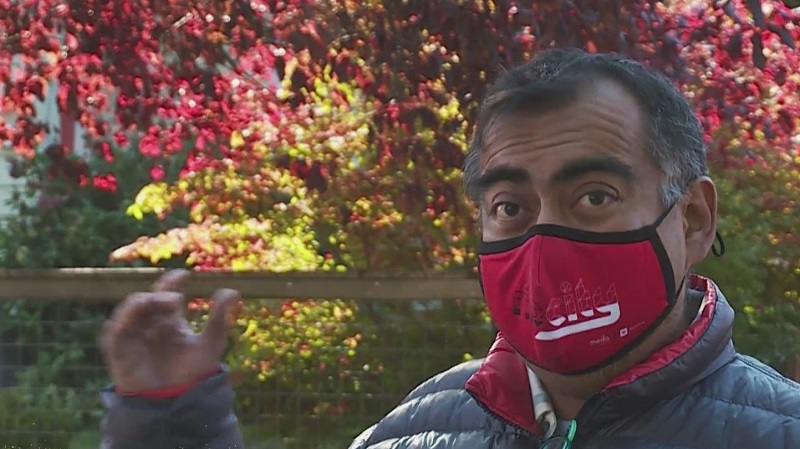
They said they’ve been begging the city to do something.
“We shouldn’t have to scream this loud to get something done,” Hall said.
“This is my neighborhood. I’m coming, I’m cleaning, I’m doing my thing,” Hardt said. “And I’m not going to be chased off by the homeless.”
Sugahbeare said she just wants to know what rules will be enforced. “Just tell me that.”
A cleanup was coming
On the city’s One Point of Contact website to report homeless camps, each dot represents complaint after complaint after complaint filed over weeks.
In September, residents in the North Lombard and Montana neighborhood were told a cleanup was scheduled. On the city’s website, the “North Lombard and Montana” camp was listed as “cleaned” on September 13.
The next line states: “Locations in bold face font indicate campsite removal.” This camp is listed in bold type.
The problem is, neighbors said, the cleanup crew left a lot of garbage behind on the neighborhood side of the fence — and didn’t touch the camp on the ODOT side of the fence. However an intergovernmental agreement means it’s the City of Portland’s responsibility to move people out of homeless camps.
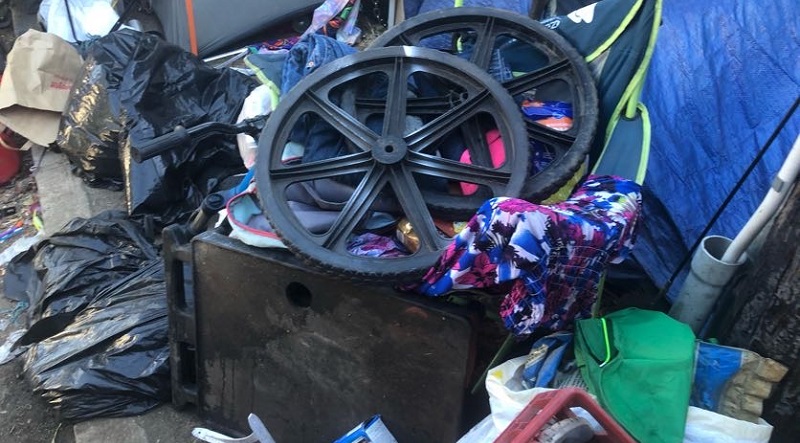
“It’s frustrating,” neighbor Vikki Payne said. “I know everybody in the city is dealing with it and it’s just galling to me that they’re lying now and saying they’re removing these camps. So everybody else in the city, if they look at this website says, ‘Oh, that camp got cleaned up. Great.’ Sure, it didn’t.”
City officials told KOIN 6 News it is removing far larger homeless camps now than the ones removed before the pandemic. Sites that used to take one work crew a half-day to remove are now taking 6 crews about 2 weeks to clean.
As of late October, the agency has done about 2800 site assessments in 2 months — that is the number of times someone went to an encampment and assessed its health and safety for cleanup.
On the day KOIN 6 News visited the site, the trash on the neighborhood side of the street was being cleaned up by Terrance Moses, who runs Neighbors Helping Neighbors.
“I just think that, hopefully people see through me that we could be a little more compassionate and step outside of our comfort zone and help other folks,” Moses said.
He spends 6 days a week doing the cleanup work the city can’t get to through donations. He also spends a lot of time trying to build trust with people living in homeless camps to steer them toward services.
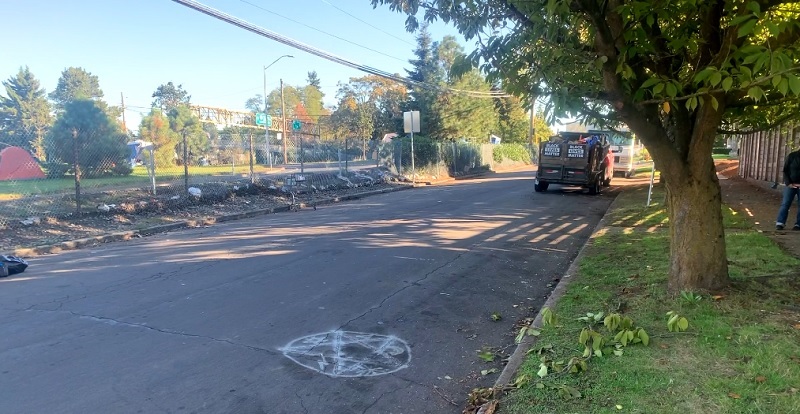
Moses understands why neighbors are so frustrated.
“A lot of things that the government is dropping the ball on is there’s no urgency behind it. They’re spending a lot of money on unnecessary types of trucks to do this kind of work,” he told KOIN 6 News. “They spend a great deal of their time having to bag items because they use box trucks and they’re not funneling the money into the smaller organizations that are doing the big majority of the work.”
Even though neighbors report camps to the One Point of Contact website, it’s not always easy to get a cohesive response to clean up a site.
At one camp electrical cords were coming from a utility box to tents. At least one box was a Century Link (now Lumen) box.
A spokesperson told KOIN 6 News: “We understand the community is frustrated – as are we. We have secured our cross boxes, including placing locks and chains on them. Unfortunately, we continue to see them damaged. It’s important to us because the damage can potentially impact important services.”
Different agencies, different responsibilities
ODOT is responsible for the fence, locking the gate and fixing holes. But ODOT can only clean up camps and garbage if the City of Portland works to move people out of the camps first.
The people who are responsible for camp cleanups is the Homelessness and Urban Camping Impact Reduction Program, which falls under Mayor Ted Wheeler’s jurisdiction. But when KOIN 6 News asked the mayor in Spring 2021 about cleaning up camps along freeways and underpasses, he said that was an ODOT job.
“I want to be clear every one of the right of ways you just mentioned — the litter, the graffiti — that’s not the city. That is the state. Those are ODOT right-of-ways. And that is their responsibility,” Wheeler said at that time.
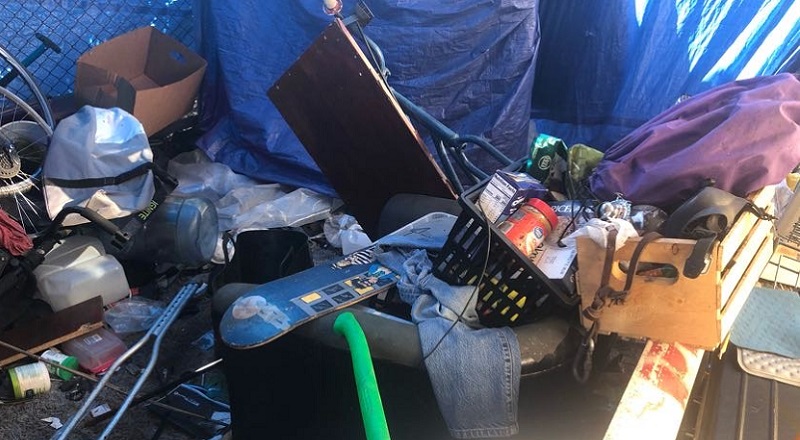
Abandoned vehicles fall under the jurisdiction of the Portland Bureau of Transportation.
Two years ago, a resident in the Lombard/Montana neighborhood asked PBOT to make parking on Montana Avenue illegal. But that request only shows PBOT has dealt with a heavy case load for a long time. They replied: “Investigations are taking up to 12 weeks to complete based on our backlog of requests and staffing.”
Multnomah County runs the Joint Office of Homeless Services with the City of Portland to oversee the delivery of social services to homeless people.
City Commissioner Dan Ryan, who runs the city’s Housing Bureau, is spearheading the Safe Rest Villages effort in the city. But that rollout is taking months longer than expected.
Then consider the city is prioritizing which camps are to be cleaned up first based on whether they are high- or low-impact. As of late October, 71 camps were considered high impact.
But city officials said, “If we were using our pre-COVID-19 standard operating procedures there would be somewhere between 200 and 300 sites that would meet (high impact) criteria. The reason there are ‘only’ 71 is because we have increased the threshold for encampment removals due to the health and safety guidelines we implemented in conjunction with Multnomah County Public Health and the CDC.”
The Lombard/Montana homeless camp is considered high impact. Officials provided pictures of the 3 days crews spent cleaning it up.
Officials with the Homelessness and Urban Camping Impact Reduction Program declined an interview with KOIN 6 News. But spokesperson Heather Hafer provided this statement:
“…most of the items in the encampment were deemed personal property which people placed on vehicles – which meant that we could not collect it. Although we performed a campsite removal, I can understand how some people might think it was partially done. However, we have very strict guidelines about what we can and can’t collect and we always adhere to those guidelines…
In regards to the encampment on the other side of the (fence), each encampment is assessed, and scheduled for removal if deemed necessary, on an individual basis…. but we have to prioritize the sites that pose the greatest health and safety risks to the community – and can only work as much as our resources allow.”

The week the Lombard/Montana neighborhood was supposedly cleaned up, another 2004 new campsite reports identifying 123 active campsites in Portland were recorded. Of those, 781 reports were people living in their cars.
Resident Laurie Sugahbeare said it feels like the neighborhood is in a loop.
“This is a bandaid. These people who left here are now somewhere else in Portland doing the same thing they did to our neighborhood, to other people,” she said. “And I feel horrible about that, ’cause, I mean, nobody deserves to live in the conditions that are now left here, even after they’re gone. What you can’t see on this report is the smell and it’s bad.”
Homeless activists and RVs return
Just days after KOIN 6 News met with neighbors in that area and the street was cleared, the RVs were back and parked again.
The RVs were followed by homeless activists all dressed in black, who appeared in the neighborhood to show support for the homeless.
Neighbors felt intimidated.
Dale Hardt, though, is not going to surrender.
“This is our home. We live here. We’re not giving this up,” Hardt said. “We’ve got 2 little kids. If you would just see them one time walking down the street, hand in hand, you would know why we’re fighting for this.”